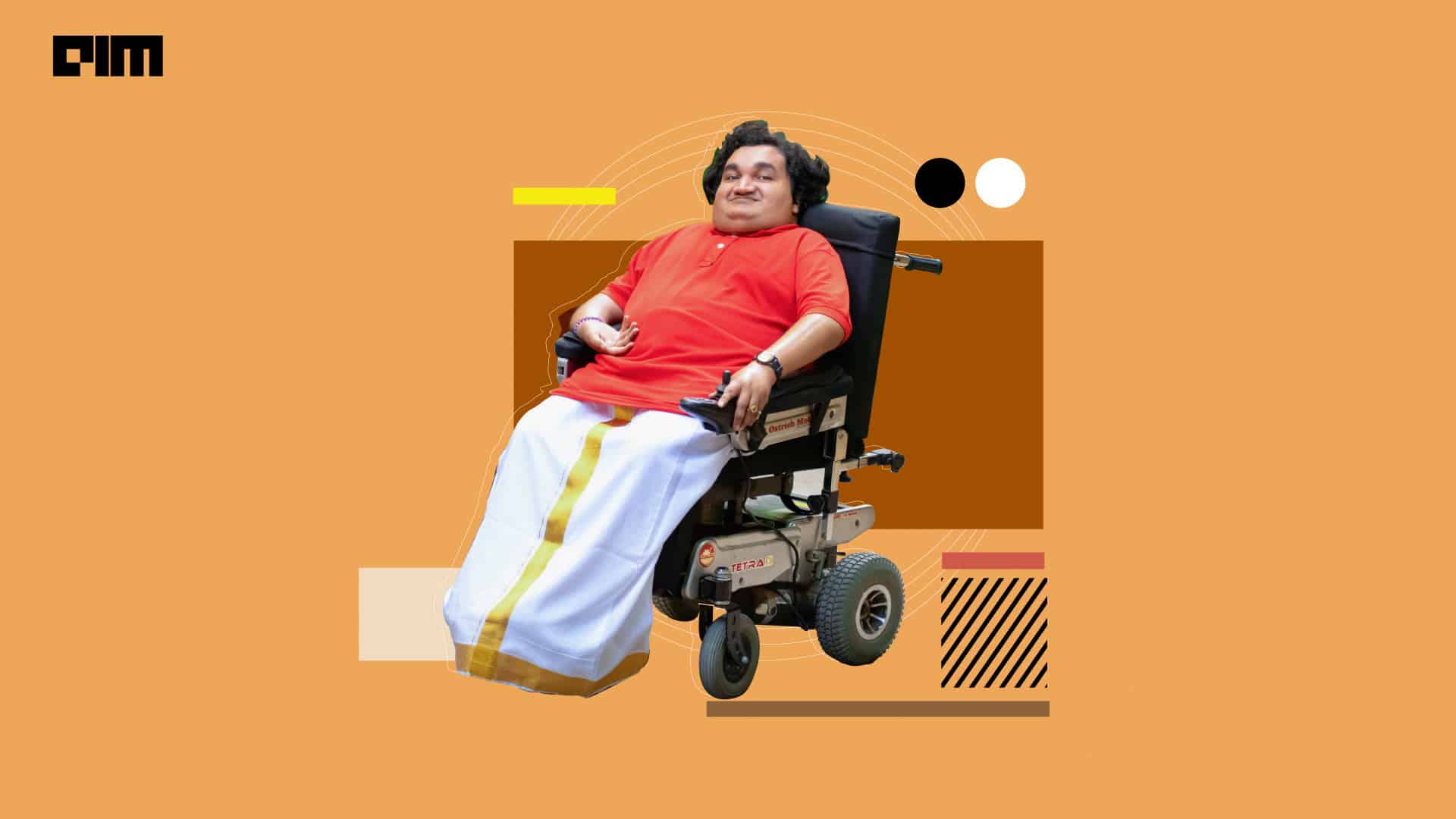
Born in the foothills of the Himalayas in Siliguri, West Bengal, Sai Kaustuv Dasgupta, a senior graphic and visual design analyst at Accenture, lives with osteogenesis imperfecta (OI), a rare genetic disorder. Dubbed brittle bone disease, this condition has led to over 50 fractures and disabilities, including 90% locomotor impairment and 80% hearing loss.
Despite these challenges, Dasgupta, aka the Wheelchair Warrior of India, believes in the power of technology to transcend physical limitations. Generative AI, particularly tools like Microsoft Copilot, plays a pivotal role in his professional toolkit.
“We use proprietary design tools in our work, which aid in excellent design outcomes. In addition, we use Microsoft Copilot for generating popular commands and content-related tasks as it helps generate many functionalities in a short time,” Dasgupta, also a global TEDx speaker, told AIM in an exclusive interaction earlier this month.
He believes that generative AI automates creative processes, personalises designs, optimises workflows, and augments overall creativity, enabling him to deliver superior design outcomes despite physical constraints. “However, a balance between AI automation and human expertise is crucial for responsible and impactful design outcomes,” Dasgupta highlighted.
Microsoft has always focused on making products accessible to all. Yesterday, at its flagship event, Microsoft Build, the company announced that US-based AI startup ‘From Your Eyes’ won the 2024 Imagine Cup student competition. The startup has developed a mobile app and API using GPT-4 and its image recognition technology to provide real-time visual explanations for users with impaired vision.
It also has a partnership with Accenture for enterprise generative AI functionalities. The latter is one of the leading companies in generative AI. The global IT giant successfully bagged multiple generative AI projects worth $600 million in the last quarter, building upon the $450 million projects secured in the preceding quarter.
Thriving with Resilience, Not Disability
Osteogenesis imperfecta (OI) causes bones to be extremely fragile and prone to fractures, often from little to no apparent trauma.
In 2009, after a major health setback, Dasgupta’s life took a pivotal turn. Restricted to his home, he discovered a new passion for graphic design.
“But after fifty fractures, I stopped counting. I had reached a point where my limbs were almost completely impaired. I could only move my left hand and one finger in the same hand,” he recalled.
Dasgupta’s resilience and determination led him to achieve world records. Using his one functional finger, he became the fastest person to type with one finger, earning a place in both the Guinness and Limca Book of Records. His story of perseverance extends beyond personal achievements, inspiring many within and outside the tech industry.
Awarded the 2022 Accenture Global Equality Champion Award and the 2023 I&D Changemaker title, he has made significant contributions to inclusion and accessibility for individuals with disabilities. He actively participates in discussions and awareness campaigns, addresses sessions at Accenture events, and supports their inclusive internship program. Nominated for the Abilities Unleashed leadership program, Dasgupta works to make India more wheelchair-friendly and was listed on the D-30 Disability Impact List in 2021.
In 2023, he received the National Award for Individual Excellence in the Shrestha Divyangjan category from the President of India Droupadi Murmu, enhancing the visibility and acceptance of people with disabilities.
“Over the years, I’ve learned to focus on my abilities rather than my limitations and appreciate the smallest victories, like having the functionality of one finger. And having used a wheelchair for the last two decades, I have learnt that disability does not reside in our bodies, but only in our mindset,” he opined.
Enter Accenture in Navigating Challenges
In the early stages of his career, Dasgupta faced challenges due to the lack of accessibility features like wheelchair ramps, accessible washrooms, and ergonomic workstations in some organisations. Additionally, his disability caused him to face biases and underestimations of his capabilities, which required extra effort and determination to overcome.
However, joining a global consulting firm like Accenture marked a turning point for him. The company’s commitment to disability inclusion provided him with an accessible workstation, bone-conduction headphones, and a motorised power wheelchair, greatly improving his ability to work efficiently. This support was crucial in helping him focus on his strengths and build a strong career path.
Accenture prioritises hiring and developing individuals with visible and invisible disabilities, ensuring an inclusive culture. It provides technology, resources, and training for a barrier-free workplace and encourages discussions on disability inclusion and mental health.
Its initiatives include merit-based employment, specialised recruitment, an inclusive internship programme, and technology solutions like the Disability Adjustment Request platform and Dhvani for communication aids. The Abilities Unleashed program empowers employees with disabilities to plan their careers and become leaders. Sensitisation efforts and a global ally network support ongoing inclusion and collaboration.
Despite reaching a leadership position, Dasgupta continued to face challenges, including a lack of awareness and resistance to change. He tackled these by promoting open dialogue, offering sensitisation, and embedding inclusion into daily practices.
His leadership mantra, “Listen, Learn, Lead,” highlights the importance of understanding diverse perspectives, continuous learning, and advocating for inclusion.
“My other mantra is to think out of the box and do something which you are good at! Life is short, so celebrate it fully and value every moment. Be thankful for your abilities. If Dasgupta, who is 90% disabled and 80% hearing impaired, can be successful, you certainly can,” he added.
Dasgupta advises individuals with disabilities in the tech industry to embrace their unique strengths, self-identify their disabilities to their organisations, and participate in support networks such as disability-focused employee resource groups and ally networks. He stresses the importance of open communication with managers and colleagues to create a more inclusive and supportive work environment.
“Inclusion starts with you. So, take the first step, and others will follow your actions,” concluded Dasgupta.
Dasgupta’s story is not just one of overcoming adversity but also one of inspiring others to see beyond limitations and harness their potential.
Read more: Embracing Identity: The Journey of Sujoy Das























